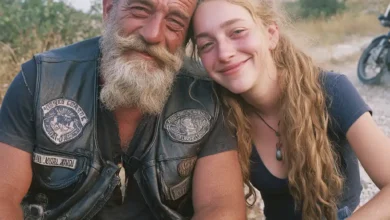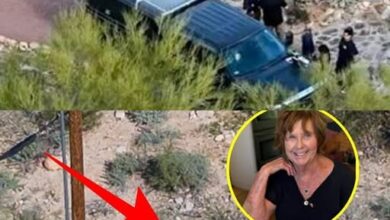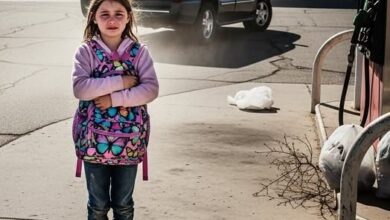
The Blossoming of Five, The Night of Abandonment
The hospital room was dim and quiet, save for the soft hum of machines and the distant cries of newborns echoing down the hall. Anna Carter lay propped against thin pillows, her body aching from the impossible task it had just endured. She had not given birth to one child, nor even two—but five. Five tiny lives, swaddled in white blankets, lined neatly in bassinets, waiting for her love and protection. She should have been basking in joy, but her heart was racing for another reason.
Only minutes earlier, Richard had stormed out, his voice still ringing in her ears. His face had twisted with fury, his pride wounded beyond repair. “I won’t be a laughingstock,” he spat. “Sign whatever papers you want. As of today, you and those children are nothing to me.” Then the door slammed with a finality that felt like a verdict—abandoned, unwanted, alone.
Anna’s tears blurred her vision as she gazed at her children, their fragile fists waving in the air, their cries harmonizing with her own silent grief. She dragged herself upright despite the pain in her body and leaned over the bassinets, trying to gather as many of them as her trembling arms could hold. “I don’t care who leaves us,” she whispered through tears. “You are mine. And I will protect you. Always.”
That vow became her compass.
When she left the hospital, the world outside proved even harsher than she feared. Whispers followed her like shadows. Neighbors gossiped that five babies at once had to mean infidelity. Richard’s family spread lies to protect his reputation, saying Anna had trapped him with children that weren’t his. Landlords slammed doors at the sight of her juggling five infants. Survival became her only focus.
Her days blurred into endless sacrifice. At dawn, she prepared bottles, changed diapers, and packed tiny bags before heading to her first job at a diner. She smiled through exhaustion, carrying trays of coffee and pancakes while silently praying the sitter she could barely afford was watching her babies closely. By afternoon, she cleaned offices, scrubbing floors and emptying trash cans. At night, while her children slept together in a cramped room of their modest apartment, Anna sat at an old sewing machine, patching clothes and stitching fabric scraps into dresses. Every cent counted. Her hands cracked from soap and needles, her body ached constantly, but she never gave in. Skipping meals, working until she fainted, she repeated the same words to her children every night: “We may not have much, but we have honesty. And we have each other.”
As the years passed, the quintuplets began to bloom in their own ways. David filled notebooks with sketches of bridges and buildings, a future architect in the making. Naomi grew into fire—bold, fearless, quick to defend her siblings, her sharp tongue the mark of a future lawyer. Grace carried music in her soul, singing lullabies at night that soothed them all. Lydia devoured numbers and puzzles, a mind sharper than most adults around her. Ruth, the quiet dreamer, turned old cardboard and crayons into art that imagined worlds beyond their hardship.
But their brilliance didn’t shield them from cruelty. Classmates mocked them for not having a father. Teachers filled forms asking for “father’s name,” and the silence stung like a fresh wound. Once, David had his sketchbook stolen by bullies, who sneered, “Drawing a dad who’ll finally show up?” Naomi confronted them the next day, her fire silencing their laughter but earning her a reputation as “trouble.” Grace froze during a recital when a boy shouted, “Sing louder! Maybe your dad will hear you!” Anna, standing tall in the front row, clapped and cheered louder than anyone, drowning out the cruelty. That night, when Grace asked softly, “Why doesn’t he love us?” Anna’s voice trembled but remained steady. “Because he doesn’t know how to love. But you do. And that will always be enough.”
Lydia buried herself in studies, tutoring older students to bring in extra money. Ruth painted murals of family unity on their apartment walls, insisting, “We already have a family. We don’t need him.” Each child carried the scar of Richard’s absence differently, but Anna fought to teach them pride, not shame.
As teenagers, they shone despite adversity. David won a city art competition for his futuristic designs. Naomi earned medals on the debate team. Grace joined a regional choir. Lydia topped her math classes and tutored others. Ruth’s paintings were displayed in a community center. Their triumphs were small lanterns of hope against the weight of poverty and rejection.
When adulthood came, each carved a path. David earned a scholarship in architecture and began designing sustainable cities. Naomi pursued law, dismantling opponents in court with the same fire that once protected her siblings. Grace’s voice carried her onto international stages. Lydia became a financial consultant, slicing through prejudice with precision and brilliance. Ruth’s art touched strangers’ hearts, her canvases telling stories of pain and resilience.
Yet the shadow of Richard never disappeared. Interviews, forms, and casual questions always circled back to the absent father. Some siblings deflected, others answered bluntly, but none escaped the ache. One night, Naomi demanded, “Why don’t we tell the world the truth? Why does he get to live with his reputation while we carry his shame?” Anna only replied softly, “The truth needs its moment. And when it comes, no one will deny it.”
That moment arrived unexpectedly during Grace’s first sold-out solo concert in their hometown. Her voice filled the hall, rich with sorrow and triumph, when a heckler shouted cruelly from the balcony: “Before you sing about love, do you even know who your father is?”
Grace faltered, her chest tightening, until Anna rose from the audience. With silver hair and trembling hands, she walked onto the stage and took the microphone. Her voice carried steady across the silent hall: “My children have always known their father. His name is Richard Cole. Thirty years ago, he walked out of the hospital the day they were born. He chose pride over family. These children are his blood. But look at them now—an architect, a lawyer, a singer, a consultant, an artist. They turned abandonment into triumph. I promised to protect them, and love carried us here. Stronger than shame. Stronger than him.”
The hall erupted in applause, a standing ovation that shook the room. David, Naomi, Lydia, Ruth, and Grace walked onto the stage, surrounding their mother, proud and unbroken. Grace lifted the microphone again, her voice soaring stronger than ever, carried by truth and love.
The next day, headlines exposed Richard Cole. His carefully polished reputation collapsed under the weight of Anna’s truth. Anna herself sought no revenge. She only felt lighter, free of decades of silence.
Her children thrived even more. David designed community centers for single mothers. Naomi defended abandoned families. Grace’s music resonated deeper than ever. Lydia built scholarships for students from broken homes. Ruth painted a masterpiece called The Promise, depicting a mother holding five children against a storm.
Years later, Anna sat on her porch, white-haired and weary, watching her grandchildren play. One climbed onto her lap and asked, “Grandma, wasn’t it hard to raise five kids alone?” Anna smiled softly. “Yes, it was hard. But when you love someone, really love them, nothing is too hard. Love makes you strong. Love makes you brave.”
And as she looked at her grown children—proof of her vow—Anna knew she had kept her promise from that first night in the hospital. She had protected them. Always. And love had won.




